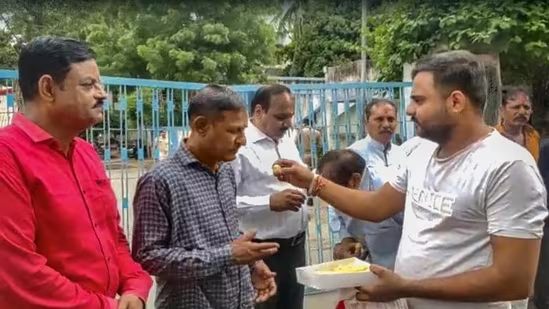How do you continue to hold out hope with the weight of the State’s boot on your neck? The message is clear: In their quest for justice, women are unequal citizens, some more unequal than others.

The men were garlanded and feted at the Vishwa Hindu Parishad (VHP) office in an utterly obscene display of triumphalism that mocks every woman who seeks justice for rape. (PTI)
Eleven men were sentenced to life imprisonment for the gang rape and murder of 14 people in the 2002 Gujarat riots. Among their victims was Bilkis Bano, 19 years old and five months pregnant. She begged the men, many of whom she knew, to spare her. Instead, they took turns raping her and the other women, including her mother, and bashed the head of her three-year-old daughter on the ground, killing her and 13 others.
After 15 years in jail, late on Independence Day, the 11 men walked out of Godhra jail like conquering heroes. A day later, they were garlanded and feted at the Vishwa Hindu Parishad (VHP) office in an utterly obscene display of triumphalism that mocks every woman who seeks justice for rape.
The men are home under a remission policy that allows for the release, under certain conditions, of prisoners serving life terms. It’s a policy endorsed by guidelines issued by the central government earlier this year. Underpinning the remission policy is the belief that justice is about reformation, not retribution; that human beings are capable of reform.
The government used a two-page 1992 policy to free the men. But under a more elaborate 2014 policy, these men don’t make the cut. The 2014 remission policy is explicit: If you’re convicted of rape and gang rape or if you are found guilty of a crime investigated by the Central Bureau of Investigation or CBI (as this case was), you don’t qualify for a get-out-of-jail card. CBI-investigated cases must have the approval of the Centre. If this was given, the Ministry of home affairs should explain how and why.
Concerns about escalating violence against women have only grown since the gang rape and subsequent death of a physiotherapy student in December 2012. Public anger against that crime led the Congress-led United Progressive Alliance government to amend the criminal law in 2013 and bring in the death sentence.
But public sentiment can be an unreliable barometer. There was overwhelming support, for instance, for the extra-judicial killing by the police of four men accused of raping a veterinarian in Hyderabad. It is public sentiment again that has led to the gradual expansion of the death sentence for rape — the most recent being in 2018 that mandates it for the rape of girls younger than 12.
Public sentiment is not uniform and outrage hinges on several factors, including the socioeconomic status of the rape survivor. The rape of a Dalit girl elicits no protest marches. But, ultimately, majoritarian sentiment cannot guide our justice system. Bilkis Bano fought with little support for 17 years. It took the Supreme Court’s intervention to transfer her case out of Gujarat. “I trusted the system,” she said in a statement. “The release of these convicts has…shaken my faith in justice.” The loss of faith is not hers alone but “for every woman who is struggling for justice.”
How do you continue to hold out hope with the weight of the State’s boot on your neck? The message is clear: In their quest for justice, women are unequal citizens, some more unequal than others.
Namita Bhandare writes on gender
The views expressed are personal